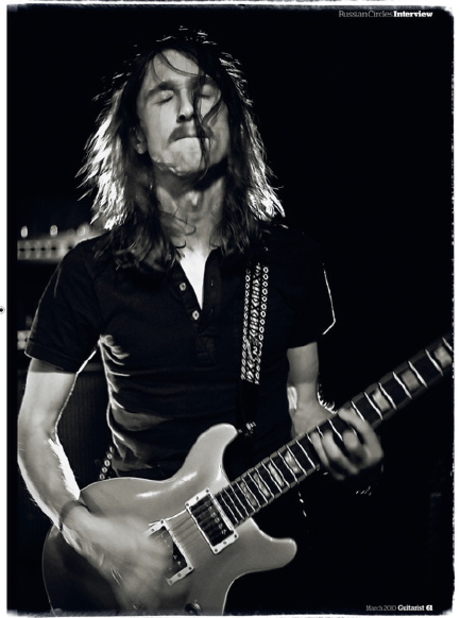
Want all the hottest music and gear news, reviews, deals, features and more, direct to your inbox? Sign up here.
You are now subscribed
Your newsletter sign-up was successful
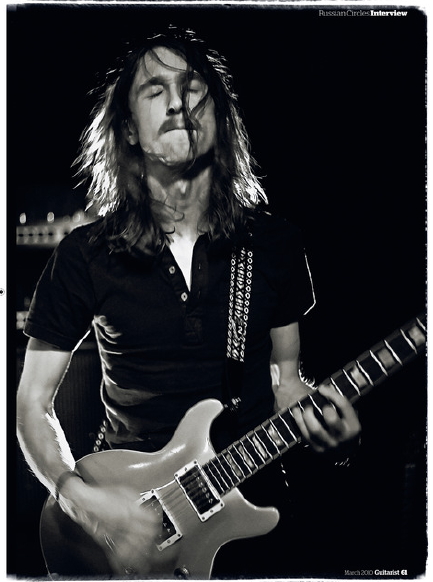
Photo credit: Brandon Cummins
We're all Russian Circles fans here on Guitarist - there is simply no other instrumental band making music as atmospheric, emotional and powerful as this US trio.
Back in issue 326 we featured guitarist Mike Sullivan but now here's the full transcript of our conversation with even more detail on the making of their third album Geneva and Mike's special playing approach.
One of the biggest changes to your sound on Geneva is bringing in musicians outside of the band for a number of tracks - string and brass players. How did that come about?
Mike Sullivan: "The strings were something we had planned out long in advance. We made sure we got together with the cellist and violinist, arranged the parts and had that all worked out.
"The brass came about because Greg [Norman engineer] plays trumpet and trombone. Late at night when we were done tracking he'd be kind of messing around after we'd had a few beers. He's try some stuff out and it started off as a joke but then we'd go away for an hour and he'd worked something out and we thought, these horns sound pretty good - let's do it. It was kind of a last minute thing."
How do you feel about your own playing on this album? In some ways it sounds like you're playing less on a technical level but bringing even more to the atmosphere and mood of the music…
Want all the hottest music and gear news, reviews, deals, features and more, direct to your inbox? Sign up here.
"Exactly. It wasn't a conscious shift but in the evolution of what we've been doing so far, it just seemed natural. I guess we're more concerned about the actual arrangement than how technical it is. It's also fun to do the technical stuff too so I can't say that's behind us but it felt more natural this way for all three of us. We can play off of each other more - it's more open to that. More room for expression."
Were you less concerned with being able to completely recreate this album live than you have been in the past?
"Yes. At this point, this being our third album, we felt a little more freedom to add elements. If we hear more things that could go into a song - let's throw them in there. A nylon string guitar or a different drum that can add percussion over what is already there… if we can hear something let's try it and if it works cool, if it doesn't let's not push it. But at the root of it we are a three-piece band and we keep that in mind when we're in the studio and adding stuff. A lot of the songs would sound different live without the strings but I don't think they'd lose too much by that."
So using samples live isn't something you'd consider in the future?
"We're not opposed to that actually. We're leaving to go on tour in two weeks and we're still playing with ideas. Still deciding which songs we're going to perform.
"You do lose a some of the organic quality when it's for an actual instrument, like a cello per se, but we'll see how it goes. I think it will work out fine and a lot of the songs and a lot of the songs so far we're going to be playing live don't really involve strings that much so it's not an issue. A lot of the strings either came from a melody that Brian or I had on keyboard or guitar transposed to strings so it's something that one of us did originally, then we let the strings take care of it."
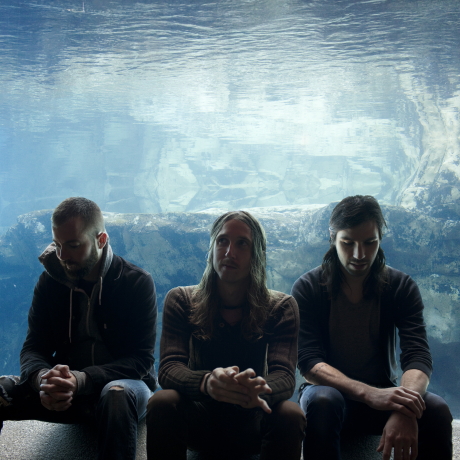
Russian Circles (from left): guitarist Mike Sullivan, bassist Brian Cook, drummer Dave Turncrantz
The title track, Fathom and When The Mountain Come To Muhammad are incredibly dark, desolate sounding songs - what were the influences behind that mood? Were there books or films that inspired you?
"There isn't a source we can point to in terms of influence. It's more the mood of what was going on personally between the three of us - not between us as people but in our own lives. Most of it was written back in Wisconsin where Dave lived for a time. It's a remote area and it was winter so we were up there on our own free to do whatever we wanted.
"I think the environment definitely had something to do with it. But it's been a tense year and a half for people personally and I think it came out through the music without us having to bitch about it to our friends instead! Our friends are probably thankful to us for not opening our mouths."
Did you experiment with your gear more on this album? Amp placement for example…
"I had two amps going for each take - the Sunn Model T reissue and then a 100-watt HiWatt head in the studio but I'm not sure what model that one was. That sounded good next to the Sunn, a little bit different - not quite as dark for some reason. I think we had a little Fender Bronco too that had blown out for tones if we needed.
"The experimentation was with the guitars more than the amps though. I usually use Les Pauls with humbuckers but there's a lot of Telecaster on this record. For the cleaner passages it really gave more articulation - adds more touch. It sounds more exposed, in a good way, and added more to the desolate sounding passages. It has less bottom end so makes for more separation between Brian and I.
"I'd also try different guitars for different takes - so if I was doing an overdub I'd look for a different tone for it. Most of it was still Les Pauls - an ebony Custom. I'm using Bare Knuckle Miracle Man pickups and for the louder, heavier songs they sounded awesome. Those arrived a week before recording so perfect timing. There's a few weird guitars here and there too - a Veleno Italian aluminium guitar. That was used for the opening drone guitar part on Fathom and it worked out really well for that."
Is that your guitar?
"It's actually Steve Albini's that he keeps in the studio. All his gear is laying around there so as a huge fan it's hard not to geek out and check it out! But that guitar had a piercing mid range, that's the nature of the construction, so that was just great for an irritating, abrasive tone that warmed up to the amps a little. It helped to standout against the guitar sound that follows it. I'm learning that even bad tones can be used in a good way."
What Telecaster did you use?
Actually it's a Telecaster-style guitar by a friend of mine, Scale Model Guitars is the name of his company. He had a prototype Tele-style laying around - that was also fitted with Bare Knuckles as a matter of fact - but it was heavy as hell. It weighed eight or nine pounds. It was like a tree trunk! Well maybe not that bad but it was heavy. Whatever it was made from, it was certainly substantial.
"So I used that and an old Tele of mine which I've had since I was a kid. That thing is really high end - no bass whatsoever - so we used it for a few parts here and there to distinguish it from the other Tele. It could have probably been done with a pedal but it always feels good to mess with things and get a nuance here and there."
So you're a convert to Bare Knuckle pickups now then?
"Yes, I came across them from my friend who makes Scale Model Guitars then I got in touch with Tim from Bare Knuckle and we exchanged e-mails back and forth. Then he offered to send me some stuff for free and I've been very impressed with them for sure. They get plenty of love over here in the US. The word is spreading over here."
What delay units did you us for the album?
"I used a Memory Man for a longer, kind of washed out delay sound. For a quick, not quite slapback, short delay I used a MXR Carbon Copy. Those are pretty cool and they're certainly analogue in the way the signal decays very quickly. Those are cool - a fun little pedal.
"There's some Moogerfooger delay here and there just because the Memory Man is so noisy for quiet stuff. That was cool - the Moog stuff is always a blast to play. There was a BOSS DD-3 for Malko to get a really syncopated soulless delay - that was great for that."
What about overdrive?
"That was interesting. I used a lot less gain on this album than I have done previously but it worked out sounding a little fuller for some reason. We did less guitars tracks, less overdubs.
"I used a TS-9 with a Keeley mod and that was actually Brandon's who produced the album - he brought a whole suitcase of pedals for us to play with. I had a Fulldrive 2 before that and wasn't totally happy with it but that TS-9 has some sparkle to it and all the notes ring out in a unique way. Different to a stock TS-9 for sure. That was for a milder distortion but for the full-blown mondo distorto it would be the Fulltone OCD because that thing is just a wall.
"I also used a [Crowther] Hotcake here and there but because there was all kinds of crap laying around we'd throw things in. For the most part it was the OCD though."
"I'm into the Fulltone Minivibe right now. That thing is awesome for me when I'm looping. That pedal will sound a little higher for some reason - it colours the tone a little so when you add another loop on top they sound different.
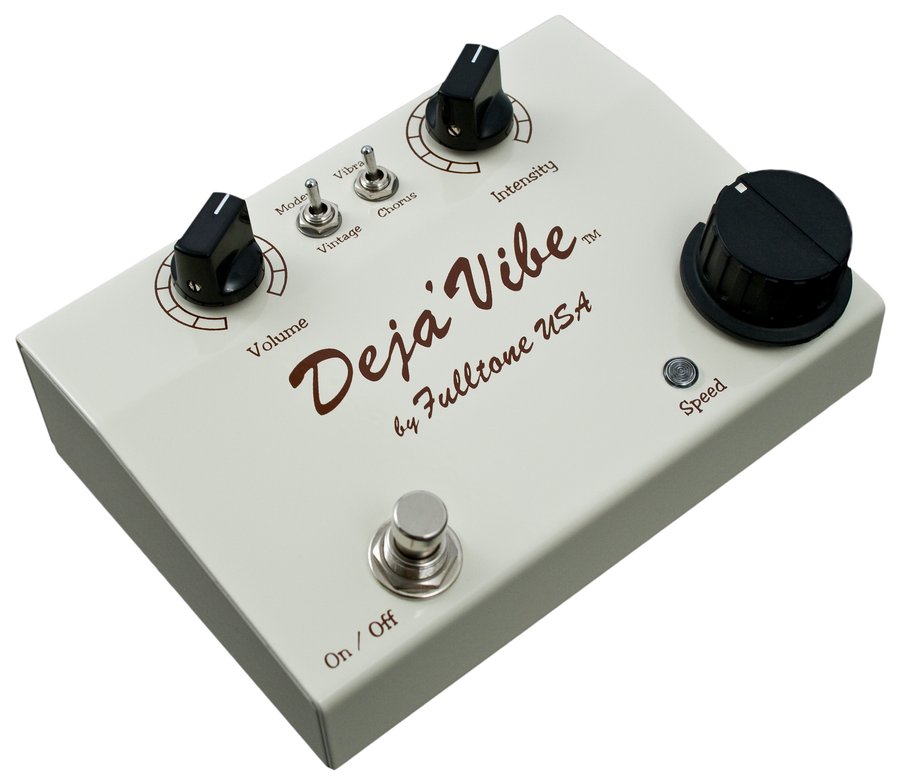
Will any new equipment be going into your live rig?
"I'm into the Fulltone Deja Vibe right now. That thing is awesome for me when I'm looping. That pedal will sound a little higher for some reason - it colours the tone a little so when you add another loop on top they sound different. It helps me make the distinction between different loops. As far as new toys that's my latest obsession and that's used here and there on the album too."
Brian joined the band on bass or the Station album but it sounds like he's been a much greater influence on Geneva. How did he affect the music?
"When we wrote Station he wasn't in the band, Dave and I had already written all the songs and when Brian offered to play on the record for us we said, cool. We didn't have a bassist at the time and we needed to get that record out for ourselves more than anything else. We gave him the demos and he played to those and we didn't rearrange things too much after that.
"This time around Brian was much more involved. Most of the writing happens with Dave and I, Brian is in Seattle and we're in Chicago. We'll get the foundation for a song and he'll come in and say, I have an idea for this - he'll come out with certain basslines and a certain bassline can change the whole feel of a song. The direction could change 180 degrees from any one of us changing one part. I hear a jazzy metal riff, then Dave will play something completely the opposite of that and Brian will come up with something really interesting. I then leapfrog and the song takes off by itself."
Is that way of working challenging for you as a guitarist?
"Yes - things may come from me melodically but they can often springboard other ideas and I end up dropping the original riff or whatever that I was working on. But it's cool though - everything feels more collaborative that way and it was more comfortable to record and play because all three of us were working together. If somebody wasn't comfortable with one part we'd work on it or change it to make sure all three of us were onboard. It was meticulous and we'd make small changes here and there."
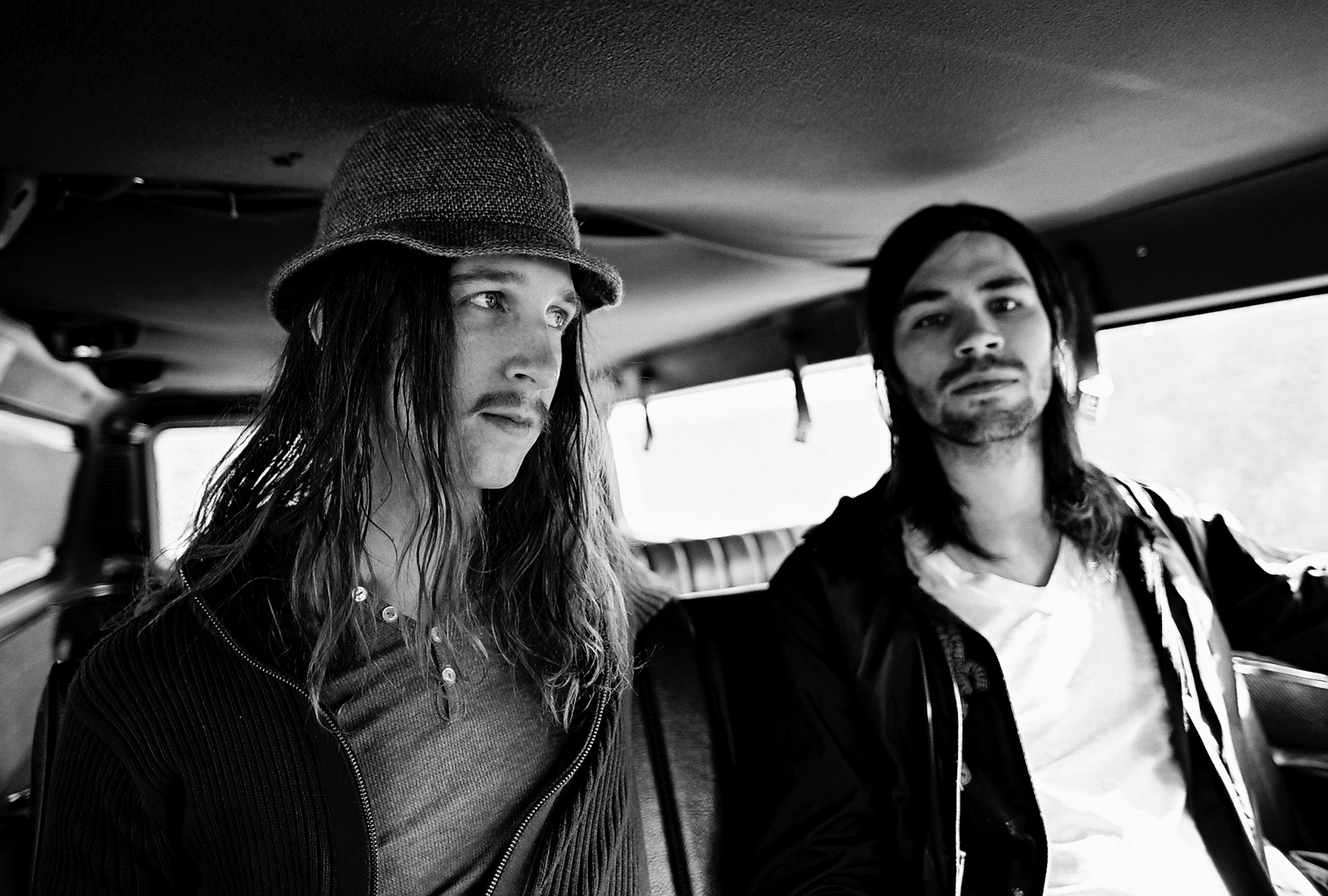
Hexed All is a very restrained song, it's almost like a waltz - did that go through different versions before you got to that sound?
"That one started originally as a nylon string classical guitar piece and then at one point in practice we started playing it a little heavier, more aggressive - more doom-sounding, if you will. That sounded cool but it lost something - it was less melancholic that way. It seemed more rock. So we went back to a slower, very simple arrangement.
"Initially, the strings and one guitar are doing a similar thing to each other then a non repeating guitar solo evolves through the track - it moves with each part but doesn't really repeat itself. So that was supposed to be a part of it but then hearing back the two different versions in the studio, we had one with strings and one with guitars but that sounded like a mush of crap, too much going on at once.
"The string version sounded more moving, there was more space but with the guitar solos it just sounded like a doodling song. And before that we have we have Malko which is a very busy, active song so it felt more natural to give the album a break before that."
Russian Circles - Hexed Allaudio
The closing song Philos is a real standout, you released another version of that earlier in the year as a split single with These Arms Are Snakes. What prompted you to go back and rework it?
"That song was written and recorded in a few days last summer. I had some chords bouncing around in my head for the intro but we intentionally didn't overthink that song and kept it simple. We came up with an arrangement and jammed through it a few times and felt some parts out. We did a few takes of it and one of them felt really good and that's the one that ended up on the split 12-inch.
"But we knew we wanted to re-do it because we saw so much opportunity to make it a better song - or at the very least a different version. We hadn't heard the song in months and it was fun to step back after all that time, it offered us a new way to look at it - more objectively, almost in the third person. We thought, we could change this, and add this… experiment with that.
"As we were recording it we were hearing ideas that made sense to try. When recording a song in a professional that you've done before it's easier but I had to relearn the guitar parts. And when I recorded them they sounded a little flat, something wasn't there so a few days later I went back re-recorded half the guitars for that and thank god I did because it would have driven me crazy if we didn't fix it."
Is it a volume swell at the start of that song?
"With a Memory Man - it's a one trick pony sometimes but I think it's more fun than playing chords, notes or straight-up shredding because it's more melody-specific. You have to think more about what notes you're playing and what feelings they'll elicit. It's more about the melody and the notes, not about thinking too much - how should I finger that part, or whatever. There are a million things you can think about when playing guitar and using [the Memory Man] almost dumbs things down but makes it more interesting."
But the more technical side of guitar playing still interests you too?
"Over the last couple of years I've been interested in experimenting in scales, not that I'm well versed in music theory by any means but it's just been about being able to elicit certain feelings through notes. All the scales boggle the mind and it starts to bore me to death after a while but taking out certain elements of that and using them for the actual music is a lot more fun."
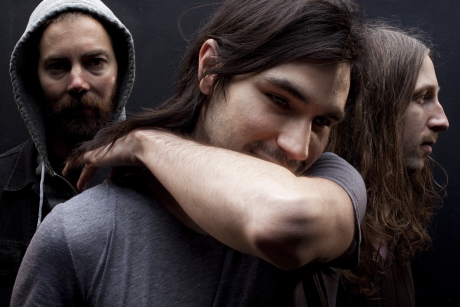
"I'm finally getting round to taking more lessons and learning more about music theory so I'm looking forward to seeing where that takes me."
Do you play other styles away from the band?
"Definitely - when I'm home it's mainly folk when I'm messing around with a hollowbody or an acoustic. When I'm by myself in the practice space it'll be the loudest, most obnoxious sound - our neighbours probably hate us that's for sure! It's fun to go from one thing to another as a guitarist, I think it's healthy and it makes you more rounded.
"Just now I'm finally getting round to taking more lessons and learning more about music theory so I'm looking forward to seeing where that takes me. I'm starting after the tour so now I'm just brushing up on all the things I was learning when I was a kid!
"I got into John Williams about a year or so ago and that just floored me. Who needs Vai and Satriani when you have this guy shredding faces off with a nylon string guitar? It's got melody to it, counter rhythms… so much going on but it's just one person doing all this stuff. Ever since then I've been fascinated with it. I couldn't do it last summer because I had a wrist injury and couldn't play guitar but that's healed up and now I'm ready for lessons."
So you'll be exploring that whole classical and folk style?
"Yes, I figured I've been playing long enough, I may as well learn a little about it! Use it as a tool, I know so little it's embarrassing so I think I owe it to myself at this point until I'm too old. Actually I think the main reason is when I got to guitar stores and I go to try and guitar or a pedal, I feel like a dumbass sitting there because I rarely play in standard tuning and I always feel on the spot and uncomfortable. So maybe it's just so I can feel not as uncomfortable in front of Guitar Center employees!"
Three acclaimed albums in, and you've been over to Europe a couple of times, as well as playing in the US, how do you feel things have progressed for the band so far?
"It feels very natural and it's progressing at a comfortable rate. When we started off we'd almost take any tour we could get - we'd very rarely ever turn down tours. We'd bust our asses touring, not worrying about who was there, who's not there - just playing. It's slowly grown, and it's good because anything happening overnight would weird me out because I'm a firm believer that it is quicker up, quicker out.
"We'd rather establish a foundation of who we are and what we do and have people support us. It's more meaningful than any quick success. Whatever happens now, happens. As long as it's fun and rewarding for us we'll keep taking this route. So far it's been fun."
Tool requested you as their support act when they played in Europe back in 2007, what was that experience like for you?
That was awesome - that was my favourite moment so far playing live. Enter had just come out on Black Records in the UK so the tour was to support that. We did three shows with Tool and the rest were with High On Fire. I'm a huge Tool fan so I'm a bit biased here but those shows were great. The crowd was very receptive which we weren't expecting. The Tool band members and their crew were really nice, very helpful - they went out of their way to make sure we were comfortable and if we had any problems they'd come and help out.
"It's funny to see a band that big and see how down to earth they still are. You see other bands who have egos that are a fraction of the size in terms of success. It was a 100 per cent positive experience for the band in every way possible."
Your use of a looper pedal is an integral part of the live sound, but there might be a perception by some that a looper is an easy route to layering guitar parts but it's actually a huge challenge in a band like Russian Circles by the sounds of it…
"It takes a lot of work to relearn our songs. It's embarrassing! It helps to have notes of what you were doing before for some songs. But it enables us not to have that second guitarist. I can have the most simple part going for minutes with a looper and a guitar player would lose their mind if they had to play it! It helps us to hear simple things back differently in the context of the song too."
"I'm surprised how cool Les Pauls can sound when they're coil tapped."
Yes, the droning sound in Fathom is so simple but so incredibly important - that's a heavier song than most of the metal bands we've heard this year because the atmosphere is just so dark and oppressive…
"I appreciate that because I listen to a lot of heavy music too and I prefer something with dissonance over something that's just thick and heavy. That can sound awesome too of course but there's something about dissonance that can make you feel uneasy and pull something out of you rather than just how heavy it is. Heavy is a relative term, if you like."
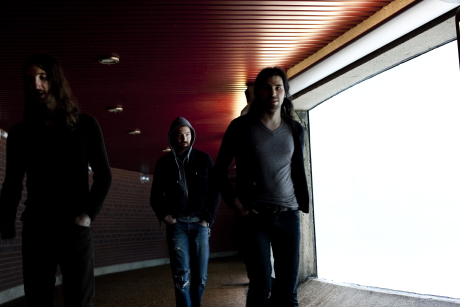
Will you be using either of your Telecasters live alongside your Les Pauls?
"No, I have a coil tap on the Les Pauls. Having a third guitar seems like a headache because I already have two different tunings and within the songs are heavier parts that I couldn't use the Telecaster for anyway. I'm surprised how cool Les Pauls can sound when they're coil tapped - it's obviously not a bolt-on Telecaster kind of vibe but it's still different enough and there's more tone to play with per song."
So one of your tunings is DADGAD, what's the other one you use?
"It's very similar to DADGAD but the high and low Ds are dropped half a step. I did that because it took my brain off the map - took me out of a comfort zone. It was a case of, OK let's not think about predictable notes here, let's make it more challenging and see what happens. After a while we did a few songs in that tuning and now it's a case of, oh crap I have to use this for half the songs in the set now! There are three songs on Station in that tuning as well as some on Geneva."
The word cinematic gets used to describe a lot of music but it genuinely applies to some of your songs - do you get many requests for your music to be used in television and film productions?
"Yes. We've been used on several television shows. We come from an underground background and we're very conscious of those DIY ethics and we're the money's coming from and where it's going to. But at the same time, if this can help support us and what we're trying to do… it helps cushion where we're at because CD sales are dying so if you can use something like that to supplement your income it helps to keep things floating."
"It's cool for me - I don't have a problem with it as long as I believe that it's not something like the US army. As far as films it's been surfing and skate documentaries but there's a recent film that used a number of songs from Station. It excites me when it's a cool project, it's a lot of fun."
Would you ever consider scoring a soundtrack then?
"Yes for sure. We're fans of a lot of artists that compose soundtracks. We listen to that as much as other music. Maybe it means I'm getting old and boring! My parents tastes and mine are becoming closer together [laughs]. It's oddly terrifying. But if something came along and it felt right, I think it would be a fun project to do because that's the most fun part of being in a band, the creative part."
"Some bands are trying to reproduce what one band did years ago. That's cool, but there's also other stuff to explore."
Looking back, what guitarists have inspired you over the years?
"It's kind of all over the place. When I was younger I was a huge metalhead - I was obsessed with Dimebag and Van Halen. At the same time I was into blues and experimenting with all these blues musicians. It wasn't until I was 15 or so that I got into Fugazi and Shellac in the same year and that changed things for me. It shaped the way I look at music now.
"It goes back to what I was saying before about dissonance where you have notes running the wrong way, it says a lot and that hit me like a ton of bricks. It was ten times heavier than whatever I thought was heavy before. It seemed more free form too, they weren't guitarists playing in the pentatonic scale. No attitude of, time for solo - here are the safe notes! It was less of that and more free. Those two bands changed everything for me."
Brian made a joke in an online interview that maybe bands should start needing a license to use a delay pedal. Do you think that whole post rock sound has reached a clichéd dead end for many other bands?
"I think it's really easy to buy a delay pedal and sound pretty good. Sounding good is one thing, but having something there to latch on to, something memorable is different. Music that puts you into a different place and feeling is another story.
"There's always going to be people who try and do that [post rock] stuff. They like it so they try to capture it and more power to them. But those who are different will always stand out. I don't really think about it too much - it's like playing powerchords, it's just one element of music. You can do it a little or you can do it too much and if you do you'll probably be thrown into a certain genre. But it is funny, I'd say half the opening bands we play with that aren't part of the tour run are usually just like a derivative band copying Isis. That's what comes to my mind when you talk about that delay thing…"
It's all been done already by that band…
"Exactly and that band are always progressing. Some bands are trying to reproduce what one band did years ago. That's cool, but there's also other stuff to explore."
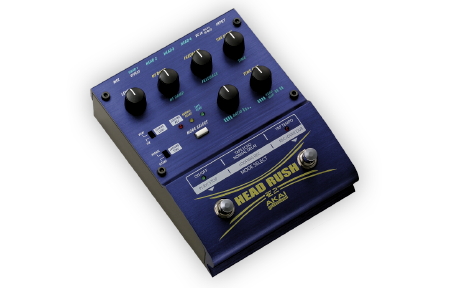
Mike favours the Akai Headrush E2 looper pedal
In the Loop
Mike's four insider tips for using a looper pedal
1. Timing is everything
"If the loop is off by even a fraction of a second and you don't immediately account for it, you'll be in a mess a few bars down the line. Know when to stop and try again."
2. Make sure the drummer can hear you
"Using a looper is a challenge for whoever you're playing with but that first loop sets the tempo. Our drummer uses a monitor and I have to make sure my loops are articulate and clear for him.
"A bad tempo means the drummer has to play around it on the fly. Sometimes you don't get the chance to fix it and have to keep things going to you don't expose the mistake. That's not good because it interferes with the flow of the song. So again, make sure the timing is right."
3. Choose the right pedal
"You need to be very comfortable with the looper pedal you choose. I've tried all kinds but certain ones it's hard to really feel when exactly they start and stop recording. With the Headrush there's no down and up motion with the pedal - it's instantly recording and there's no discrepancy for me as to when it's recording me, it's as soon as I touch it."
4. Practice, and practice again
"It's finicky using a looper and the pay-off isn't monumental, it's a lot of hard work for me just to be in time. But once you get it you're good to go."
For more information on Russian Circles visit their website at www.RussianCirclesBand.com
or their MySpace.

Rob is the Reviews Editor for GuitarWorld.com and MusicRadar guitars, so spends most of his waking hours (and beyond) thinking about and trying the latest gear while making sure our reviews team is giving you thorough and honest tests of it. He's worked for guitar mags and sites as a writer and editor for nearly 20 years but still winces at the thought of restringing anything with a Floyd Rose.